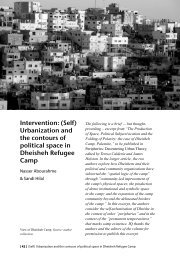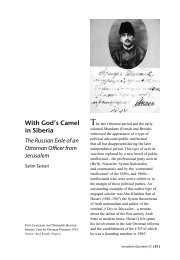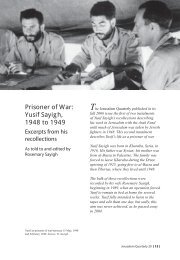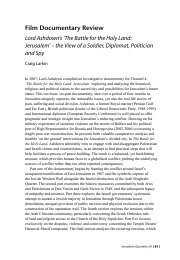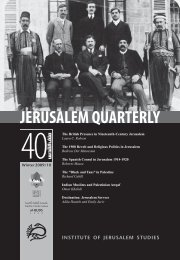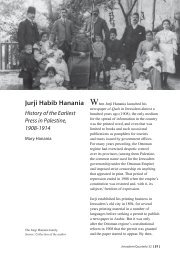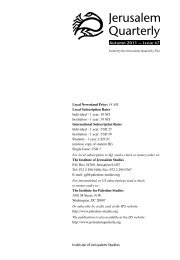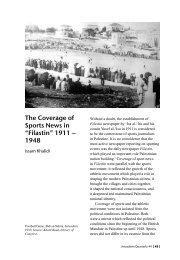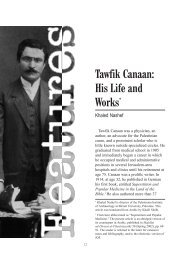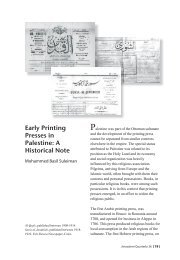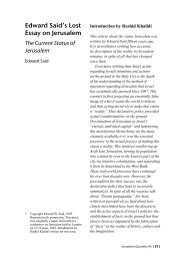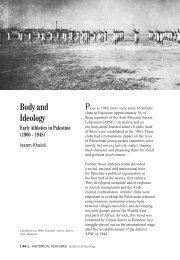PLUNDERING PALESTINE - Jerusalem Quarterly
PLUNDERING PALESTINE - Jerusalem Quarterly
PLUNDERING PALESTINE - Jerusalem Quarterly
Create successful ePaper yourself
Turn your PDF publications into a flip-book with our unique Google optimized e-Paper software.
war and exile in Egypt, where Sakakini died in 1961. In his escape from <strong>Jerusalem</strong>,<br />
Sakakini left behind not only his house and furniture (the grand piano, electric<br />
refrigerator, liquor cabinet and narghilah), but also his books, to which, two months<br />
after he had settled in Cairo, Sakakini bade farewell with emotion and pathos:<br />
Farewell, my library! Farewell, the house of wisdom, the abode of philosophers,<br />
a house and witness for literature! How many sleepless nights I<br />
spent there, reading and writing, the night is silent and the people asleep…<br />
goodbye, my books!... I know not what has become of you after we left: Were<br />
you looted? Burnt? Have you been ceremonially transferred to a private or<br />
public library? Did you end up on the shelves of grocery stores with your<br />
pages used to wrap onions? 5<br />
We now know what became of that library: Tom Segev, who made Sakakini one of the<br />
protagonists of his book on Palestine during the British Mandate, notes in a footnote<br />
what he learned from Sakakini’s daughter, Hala, who in the summer of 1967 visited<br />
the Jewish National and University Library with her sister and discovered there her<br />
father’s books scrawled with his handwritten notes. 6<br />
Palestinian Books: Collection and ‘Guardianship’<br />
On 10 and 16 June, 1948, the first two letters were written that specifically referred<br />
to the gathering of Arab books. The first is a letter sent by Hebrew University<br />
administrator David Senator to the Jewish Agency’s directorate for “urgent discussion”<br />
at the “appropriate Israeli government ministry”. A memo written by Kurt Warman,<br />
director of the National Library, and entitled “on the urgent need for a central<br />
custodian authority for handling the matter of public and private abandoned books and<br />
libraries” was attached to Senator’s letter. In the memo, Warman implores the Israeli<br />
government to grant the National Library the status of:<br />
a central certified authority, whose task would be to handle the issue of<br />
abandoned libraries, whether private or public… [Because] in our opinion,<br />
the National Library is the most suitable institution for reception and<br />
guardianship of the aforementioned books. The National Library has the<br />
means to see that the books are properly preserved, and to return them to<br />
their rightful owners, should such come forward. 7<br />
The second document, dated 16 June, is a short eight-line letter written by Yisaschar<br />
Yoel, Warman’s deputy. The letter, which is a report on the National Library’s<br />
condition, concludes with the following words: “Our book collecting project reached<br />
the Musrara neighbourhood yesterday.” 8 How can we interpret these two documents,<br />
the first a measured administrative argument for authority and guardianship to<br />
[ 10 ] FEATURES Ownerless Objects?



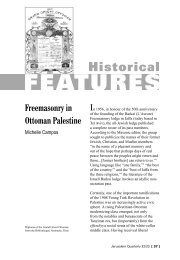
![In Search of Jerusalem Airport [pdf] - Jerusalem Quarterly](https://img.yumpu.com/49007736/1/180x260/in-search-of-jerusalem-airport-pdf-jerusalem-quarterly.jpg?quality=85)
